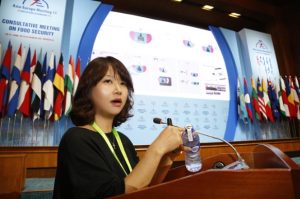Nanobrick joins anti-counterfeiting organization
Released Date: June 26, 2016

Kim Hee-yeon, marketing team head at Nanobrick, introduces the Korean company’s “M-Tag” product certification technology during the Consultative Meeting on Food Security in Ulaanbaatar, Mongolia, on Jun. 20.
Nanobrick, a Seoul-based company producing anti-counterfeiting nanomaterials, is moving to raise its global profile in combating forgery and piracy.
The company said Sunday it joined the International AntiCounterfeiting Coalition (IACC), in recognition for its technological accomplishment in developing a nanomaterial technology to stop counterfeiting issues from spreading across the world.
This will allow Nanobrick to access a wide range of IACC networks coming from its member companies ― including such luxury products makers as Chanel and Hermes ― and global anti-counterfeiting organizations, according to the company.
This is the first time that a Korean anti-counterfeiting industry player has joined the organization. Expectations are that Nanobrick will expand its profile in the global market and diversify its revenue streams by continuing to promote its products at the world’s leading security-related tradeshows.
In particular, the company’s key technology, called “M-Tag,” was named as the official product certification tool to guarantee safety for all foods, drinks and daily necessities for heads of 53 participating countries at the upcoming 2016 Asia-Europe Meeting (ASEM) in July.
An organizing committee for this year’s ASEM previously said it plans to use a system, dubbed “ASEM-Tag,” to verify all food and drink products provided by 150 companies at the global event. M-Tag was at the center of developing the ASEM-Tag, according to Nanobrick.
“The IACC is a venue where a group of international experts are joining hands to generate tangible results against fake products,” said a Nanobrick spokesman. “The fact that we became an IACC member shows that our anti-counterfeiting technology has been recognized by the international community.”
The company said it will keep searching for new growth areas in Europe where only a few highly recognized companies can expand their presence, as the continent is known for relatively high entry barriers for any new anti-counterfeiting and security solutions providers.
Last month, the IACC removed China’s largest e-commerce company, Alibaba, from its membershipa month after it joined the organization in April, amid growing concerns from global luxury brands over Alibaba’s commiment to putting an end to counterfeiting.
The global anti-counterfeiting business market will be worth around $142 billion in 2020, from $57.2 billion in 2008, according to the U.K.-based market researcher Smithers Pira.
The anti-forgery industry has grown in some limited countries including Europe and North America which take up 80 percent of the market share.
But Asia is moving to become a new growth area for the anti-counterfeiting market, as the Chinese government is toughening measures against fake products and intellectual property breaches.
Meanwhile, traditional anti-counterfeiting technologies, including Quick Response (QR) codes, have encountered some setbacks, as they were vulnerable to replications, according to Nanobrick.
The company stressed, however, its nanomaterial-based M-Tag is under little threat of replication, due to its technological complexity.
On top of that, the M-Tag takes advantage of magnetic fields, so the public can easily access it with a magnet, according to the firm. This is the biggest difference from traditional anti-counterfeiting solutions which require expensive equipment such as Radio Frequency Identification (RFID) systems, said the company.
For more information, visit www.nanobrick.co.kr

